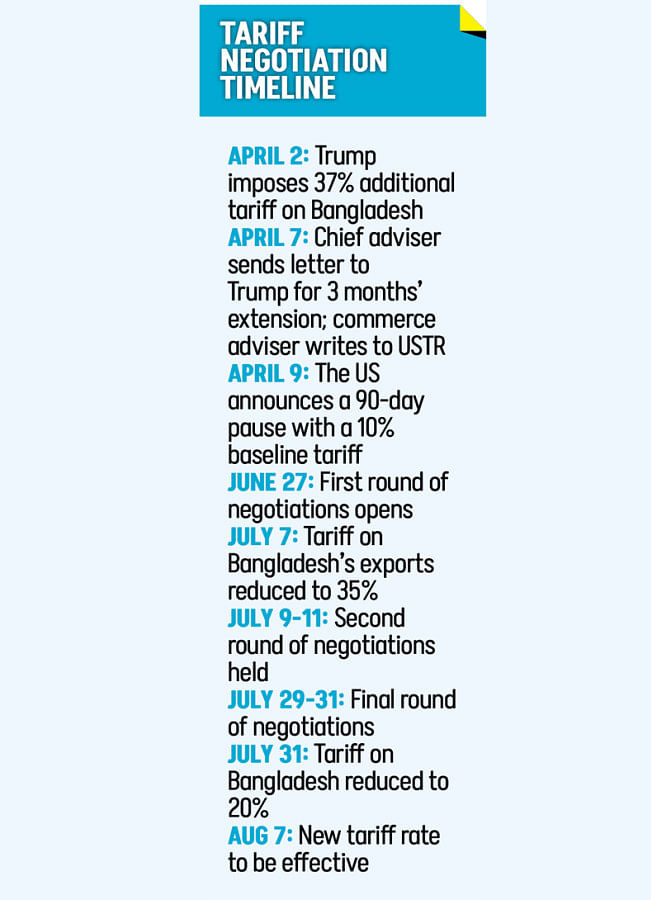Google Alert – বাংলাদেশ
Trump admin has reduced tariffs on Bangladeshi goods from 35% to 20%, a move expected to strengthen the country’s competitiveness against rivals such as India and Vietnam
WHAT BANGLADESH OFFERED
- Purchase of 25 Boeing aircraft
- Purchasing 3.5 million tonnes of American wheat over next 5 years
- Building warehouse to facilitate US cotton in Bangladesh
- Import of more US cotton, LNG
- Import of more US soybean, other agricultural products
- Removing trade barriers to facilitate US export here
- Removal of import duty on many US goods
The Trump administration has lowered its reciprocal tariff on Bangladeshi goods to 20 percent from 35 percent, strengthening the country’s competitive standing in the US market amid intensifying regional competition.
Effective from August 7, the revision is a major win for Bangladesh’s garment industry, which has long struggled to stay competitive.
With this move, Bangladeshi exporters are now well placed to increase their share of the US apparel market as they enjoy a clear advantage over regional peers in India, Vietnam, and China.
India faces a 25 percent rate and risks further penalties due to its energy and defence purchases from Russia.

Although Bangladesh’s effective tariff will reach 36 percent after adding existing duties to the 20 percent benchmark, its core exports — formal shirts, knitted polo shirts, trousers, underwear, and sweaters — face below-average duties. These five categories alone make up 80 percent of Bangladesh’s apparel shipments to the US, keeping the overall rate competitive.
Vietnam, while facing the same base rate as Bangladesh, could see its added levies surge to 52 percent when applied to high-end apparels. This burden is intensified by a 40 percent US duty on Chinese goods rerouted through Vietnam.
China itself is contending with a potential 55 percent tariff, pending negotiations.
As the third-largest apparel supplier to the US with a 9.3 percent market share, and now ahead of China in trouser and denim exports, Bangladesh is poised to consolidate its gains by capturing significant orders from US buyers looking to diversify their supply chains.
The new tariff rate, announced by the White House yesterday, was hailed across government and industry circles.
Chief Adviser Muhammad Yunus called it a “decisive diplomatic victory”, crediting the negotiation team’s “strategic acumen”. He said, “This preserves our comparative advantage and secures access to the world’s largest consumer market.”
Commerce Adviser Sk Bashir Uddin noted that although Bangladesh had sought a lower rate, the final outcome still protected its competitive standing. National Security Adviser Khalilur Rahman, a member of the negotiation team, added that the agreement includes pledges to import US agricultural goods — a step aligned with Bangladesh’s food security goals and is expected to build goodwill in key American farming states.
Industry leaders welcomed the deal, albeit with cautious optimism. Rubana Huq, former president of Bangladesh Garment Manufacturers and Exporters Association (BGMEA), said the agreement will help Bangladesh “retain competitiveness in a tough market”.
Current BGMEA president Mahmud Hasan Khan called the revised rate a “relief” but added that its true impact would depend on “consumer responses in the next retail season”.
Fazlee Shamim Ehsan, executive president of the Bangladesh Knitwear Manufacturers and Exporters Association, welcomed the move towards a near-uniform tariff structure among US trading partners. “Keeping major apparel-exporting countries within the 19-20 percent range helps stabilise global competitiveness,” he said.
From the textile supply side, Showkat Aziz Russell, president of the Bangladesh Textile Mills Association and a private-sector delegate in the talks, pointed out that the deal opens the door to importing up to $2 billion worth of US cotton in a major rebalancing, as only 5 percent of Bangladesh’s $4 billion in cotton imports currently comes from the US.
Private importer Mohammed Amirul Haque said American exporters of soybeans, cotton, and LPG had also pushed for a favourable tariff regime with Bangladesh, aligning commercial interests across both economies.
Still, challenges remain. Faisal Samad, managing director of Surma Garments Ltd, cautioned that rising production costs could offset the benefits of the tariff cut. “China will inevitably recalibrate to regain competitiveness,” he said.
The tariff cut also reflects a broader shift in US trade policy.
“It’s a strategic shift, not just towards Bangladesh but towards many partners,” said Selim Raihan, executive director of the South Asian Network on Economic Modeling (SANEM). “Sri Lanka’s rate, for example, was cut from 30 percent to 20 percent, and Pakistan’s from 29 percent to 19 percent.”
In the political sphere, the BNP described the US tariff cut as “satisfactory” for Bangladeshi exporters, while the Jamaat-e-Islami thanked Trump for lowering the rate.
Speaking to reporters at his residence in Gulshan, BNP Standing Committee member Amir Khosru Mahmud Chowdhury said, “This is not about winning or losing. … I think overall the tariff figure is satisfactory in terms of competition.”
“… the tariff won’t harm our export market at this moment. So, for now, it’s a satisfactory decision.”
Khosru, a former commerce minister, declined to comment on the impact of the new tariff rate, saying, “We don’t know the full details of the whole negotiation. We only know about the tariff part. After knowing the full details, we’ll be able to comment on this.”
Asked about the decision to purchase 25 Boeing planes from the US, Khosru said Bangladesh had to do something to cut the trade gap with the US as sought by the Trump administration.
“But while doing that, how much Bangladesh can absorb, how much our economy can absorb, how much our businessmen can absorb — these are things to talk about,” he said.
Jamaat Ameer Shafiqur Rahman thanked the Trump administration for its sincerity and the interim government of Yunus for its effective initiatives in having the tariff lowered.
In a Facebook post, he expressed hope that in the future, Yunus and those who will come to the power will maintain their honourable position and fulfill their dignified duties in the arena of world diplomacy.

